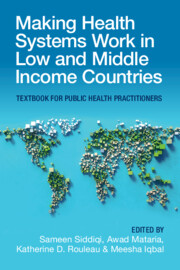 Making Health Systems Work in Low and Middle Income Countries
Making Health Systems Work in Low and Middle Income Countries Toward Greater “Donor” Independence
from Section 2 - Transforming Health Systems: Confronting Challenges, Seizing Opportunities
Published online by Cambridge University Press: 08 December 2022
The Chapter describes the ‘global aid architecture’ that comprises different players providing international assistance for health to countries, plus the mechanisms and modalities by which assistance is provided. Broadly, there are three groups of actors - bilateral donors, multilaterals donors, and non-governmental agencies and increasingly the private sector. Assistance includes financial aid as grants and concessional loans, aid in-kind, and technical cooperation, and each has its strengths and limitations. Global health governance includes decision-making and oversight at multiple levels and is inherently political. To be effective it should respond to the needs of the countries it serves, and be accountable to people and communities. Empirical evidence does not show clear link between aid flows and countries’ needs for financing. Aid frequently substitutes domestic funding in low-income countries and can undermine building of national institutions. Countries need to prioritize health in their national budgets and identify specific areas for donors to intervene. The COVID-19 pandemic has further shed light on the weaknesses of these arrangements that are often fragmented and uncoordinated.
To save this book to your Kindle, first ensure [email protected] is added to your Approved Personal Document E-mail List under your Personal Document Settings on the Manage Your Content and Devices page of your Amazon account. Then enter the ‘name’ part of your Kindle email address below. Find out more about saving to your Kindle.
Note you can select to save to either the @free.kindle.com or @kindle.com variations. ‘@free.kindle.com’ emails are free but can only be saved to your device when it is connected to wi-fi. ‘@kindle.com’ emails can be delivered even when you are not connected to wi-fi, but note that service fees apply.
Find out more about the Kindle Personal Document Service.
To save content items to your account, please confirm that you agree to abide by our usage policies. If this is the first time you use this feature, you will be asked to authorise Cambridge Core to connect with your account. Find out more about saving content to Dropbox.
To save content items to your account, please confirm that you agree to abide by our usage policies. If this is the first time you use this feature, you will be asked to authorise Cambridge Core to connect with your account. Find out more about saving content to Google Drive.